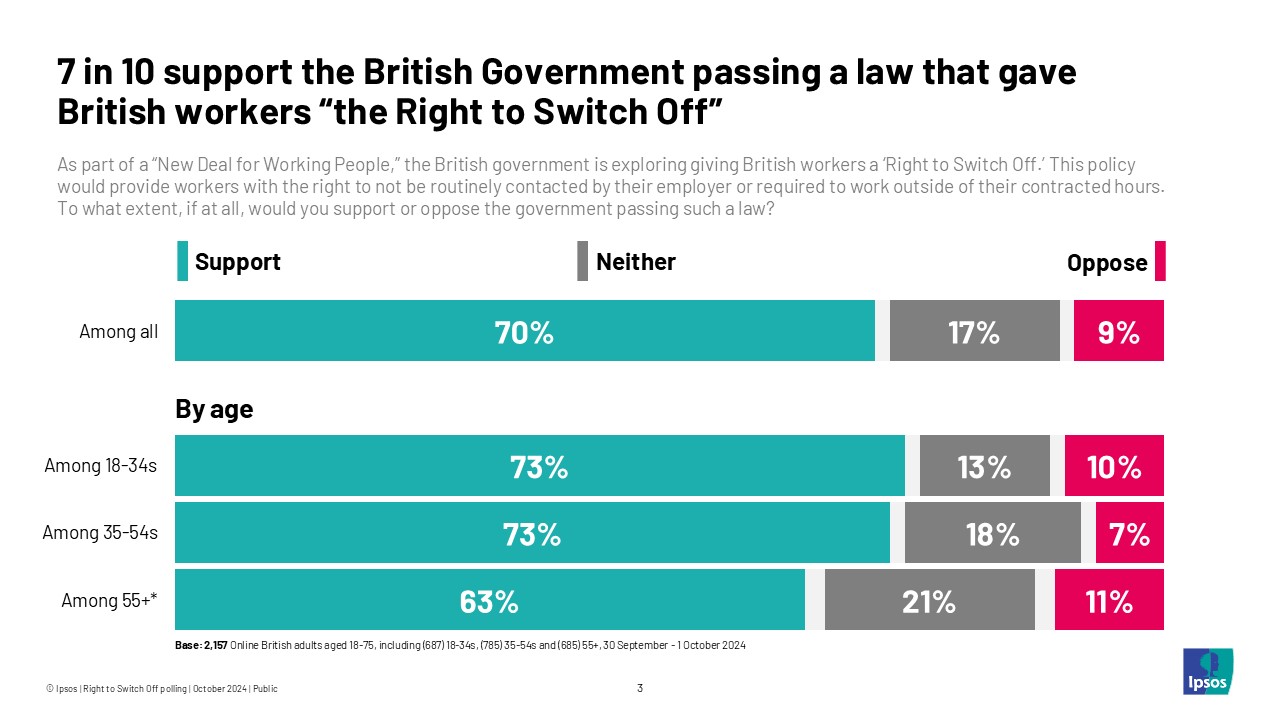Majority of Britons in favour of implementing a ‘Right to Switch Off’
- 7 in 10 Britons (70%) support Labour’s proposed ‘Right to Switch Off’ policy, which would provide workers with the right to not be routinely contacted by their employer or required to work outside of their contracted hours
- More than half of Britons in employment (56%) expect such a policy to improve their mental health, with 46% expecting it to have no impact on the British economy
- However, 1 in 2 (51%) think it will be difficult for the British government to ensure organisations are adhering to this law, should it be enacted
New polling from Ipsos reveals that a clear majority of Britons (70%) support Labour’s proposed ‘Right to Switch Off’ (RTSO) policy, which would provide workers with the right to not be routinely contacted by their employer or required to work outside of their contracted hours.

Half of British workers say they’ve checked communications while on annual leave or off sick in the past year
- Among those in employment, half each say they have checked work communications while on scheduled annual leave (54%) and while off sick (52%) in the past year
- The share who say they have checked work communications in a social setting that was important to them, such as a wedding or family gathering, falls to 1 in 3 (34%), with an equal share saying they’ve received work communications on their personal phone when they have a separate work phone
- Even without a formal Right to Switch Off in place, just 14% say they have been reprimanded for not responding to work communications outside of working hours
- There’s little expectation of this changing; should RTSO be enacted, 2 in 5 (40%) think there would be no impact on their career prospects if they were to assert their right and declined to reply to work communications after hours
- The remainder are divided between thinking that doing so would help (25%) and harm (25%) their career prospects
Questions remain about how RTSO would be enforced, enacted
- Among those in work, half each think it’s likely that senior leaders within their organisation (49%) and their immediate managers / leaders (52%) would respect the RTSO, were it to be passed into law
- When asked about the likelihood of their peers / coworkers respecting the RTSO, the share who think it’s likely rises to 3 in 5 (61%)
- More than half of those in work think the RTSO would improve their mental health (56%), with a further third (35%) anticipating it would have no impact
- The public are divided as to whether they think the RTSO would improve the productivity of British workers (38%), or have no impact (37%), with 17% saying they think it would make it worse
- More than 2 in 5 (46%) think RTSO will have no impact on the British economy, with the remainder divided between thinking it will make the economy better (24%) and thinking it will make the economy worse (19%)
Of the findings, Ghassan Karian, CEO of Ipsos Karian and Box said:
The findings show British workers strongly supporting a ‘right to switch off’ law – clear majorities of every demographic category back it. But many think it will be difficult to put into practice. For example, only one in two say that their managers or leaders would stick to such a rule. As such, it will come down to whether such a law can be enforced – and the government will have to frame the new legislation with that very much in mind.
Find more about Ipsos Karian and Box
Technical note
Ipsos interviewed a representative sample of 2,157 adults aged 18-75 in GB, including 1,279 people in employment. Interviews were conducted between 30th September-1st October 2024. Data are weighted to match the profile of the population. All polls are subject to a wide range of potential sources of error.



